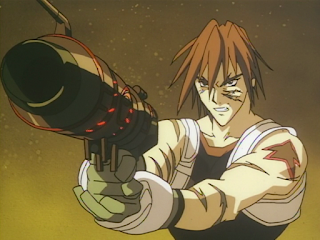Cyber City Oedo 808; or, Never Enough of Cyberpunk
I’d rather blow this thing off. But first, I’ll get rid of
this city’s parasites and scum.
This an unplanned anime review which came about due to my
dissatisfaction related with the latest Rental Reviews video from Cinemassacre.
I know that in their talk about Akira (1988), they reference Cyber City Oedo 808 humorously as an inferior instance of anime; however, some of the unaware
viewers might get the wrong picture about old OVAs because of that. My
intention is to stand in defence of Cyber City Oedo 808 and explain the
controversy behind the infamous goddamn vampire line.
Release Info
Directed by: Yoshiaki Kawajiri Voice actors: Hiroya Ishimaru, Tessho Genda, Kaneto Shiozawa
Language: Japanese Original Title: サイバーシティ OEDO 808 No. of eps: 3
Synopsis
It’s the year 2808. With the advancement of technology and
lifestyle, the crime rate also skyrocketed in the dystopian city of Oedo. In
order to combat this trend, Cyber Police began recruiting criminals with a
history of hi-tech offences and other crimes. Among them are three: Shunsuke
Sengoku, Gabimaru “Goggles” Rikiya, and Merill “Benten” Yanagawa. For catching
criminals, each of them shall receive a reduction in their prison time. Tired
with the monotony of orbital penitentiary, they agree and, as a result, start
cleaning up the town from the bad guys. However, Cyber Police have limited trust
towards them. They wear a special collar which can explode if they go AWOL
or fail to complete their missions.
"Most Starlight is Never Seen"
Firstly, we should start with defining what OVA is. It means
Original Video Animation and serves as a category for animated films intended
for direct-to-video releases. One could think that these are low-budget
productions of questionable quality in comparison to television anime. However,
the situation is actually the opposite. OVAs have better financing and more
creative freedom than standard TV anime series. Aside from promotional purposes
(attachments to manga, for example), their purpose is to tell a story that is
not suited for television. Such OVAs have higher-quality animation, more
violence, and darker tone than TV episodes. The perfect example is Cyber
City Oedo 808.
The show focuses on the adventures of three main
protagonists when battling crime in Oedo. It is a city very similar in style to
Blade Runner’s Los Angeles of 2019, but on a much larger scale. Apart from
robots, flying vehicles, and rainy streets, we get to see skyscrapers reaching
space (the ones which Arthur C. Clarke wrote about), top-of-the-line medical facilities,
and military cyborgs. The world of Cyber City Oedo 808 feels very fresh, yet
familiar at the same time. That is the case because the creators borrowed from
many sci-fi motives of the 1980s, which can be reflected in the characters’
glam rock design, sound clips (taken directly from Alien or Back to the
Future), and retro computer technology (the intro at the end of this review says it all).
Now, it’s high time to go over the horrendous clip featured
in Rental Reviews. The English dialogue line taken from OVA’s third episode
says the following (censored): “Get lost. You wouldn’t recognise a goddamn
vampire if one jumped up and f**king bit you on the end of your f**king d**k!”
This line was “creatively invented” by US Manga Corp., a dub company hell-bent
on adding as much swearing into anime as possible. The most saddening part of
this “translation” process is that there is little to none swearing in the
original version of Cyber City Oedo 808. For instance, in the Japanese audio of
the same scene in episode 3, Benten says: “Actually, the vampires of legend
were tragic creatures. Eternally young, but forever craving human blood.” So…
an exposition scene was turned into a pointless swearing scene. That’s why I
avoid English dubbing.
With regard to Cyber City Oedo 808 in general, it’s a fairly
well made cyberpunk story. Evidently, it does not have the level of polish which
Akira has, but it delivers in terms of sci-fi feel and futuristic style. The
premise of the story is great and the characters are very much likeable. I enjoyed
the trials and tribulations of Sengoku and Goggles, but Benten is my personal
favourite due to his cold voice and bishōnen appearance. Synth music score
combined with J-Pop songs by Hidemi Miura also add further merit to the show.
Recommendations
Highly recommended to anyone who is into science
fiction/cyberpunk. Cyber City Oedo 808 offers a memorable story with lots of
action and artistic design. My concluding point is that sometimes it’s unfair
to compare an OVA to a theatrical feature. That being said, this classic anime
deserves a wider recognition in the modern age. It’s a real fun to watch. Will
the real world in 2808 look just like the anime predicts? Only time will tell.
Overall score: 8/10






















